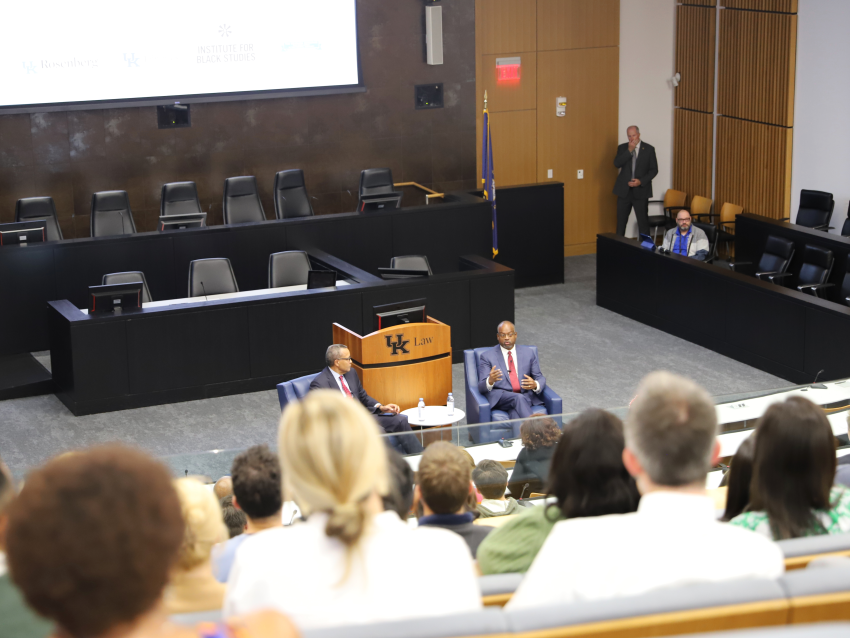
The Honorable Robert L. Wilkins Discusses His Family History at University of Kentucky
The Honorable Robert L. Wilkins, a judge on the United States Court of Appeals for the District of Columbia Circuit, joined Steven Reed, a 1986 alumnus of the college and general counsel for BrightSpring Health Services, for a conversation at the University of Kentucky J. David Rosenberg College of Law on Thursday, Oct. 10. Serving as the 2024 Roy R. and Virginia F. Ray Distinguished Lecturer, Wilkins, a native of Muncie, Indiana, discussed tracing his roots back to his fourth great-grandmother, Edy Salsbury, in Kentucky.
The conversation in the law school’s G. Chad Perry III Grand Courtroom was part of a two-day campus series of events featuring Wilkins and co-sponsored by UK Libraries, The Commonwealth Institute for Black Studies, The John G. Heyburn II Initiative for Excellence in the Federal Judiciary, and UK Rosenberg College of Law. Wilkins presented at M.I. King Library on Wednesday, Oct. 9 to discuss genealogical research using court records and other archival materials. Kentucky State Archivist Rusty Heckaman, UK Historian Vanessa Holden, and UK Special Collections Librarian Reinette Jones joined Wilkins on a panel.
"It was an honor to serve as a panelist during Judge Wilkins’ visit and to share in the telling of African American history and genealogy in Kentucky as a reflection of our efforts to document and preserve this research at the University of Kentucky Libraries,” Jones said.
During his conversation moderated by Reed at the UK Rosenberg College of Law on the following day, Judge Wilkins delved deeper into his family history, the law, and what he learned from those archives. “This is an opportunity for us to talk about justice, history, and America all woven into one,” said Reed, who praised Wilkins for being an extraordinary, impactful attorney and a legal giant.
Edy Salsbury, an enslaved woman in Muhlenberg County, Kentucky, sued in 1860 for freedom and land conferred to her, as provided by the terms of a will by her owner, Thomas Salsbury, and the ability to stay in Kentucky following her emancipation.
“In a lot of ways, the easier thing to do would have been to leave to get to an area where slavery was illegal and away from the front lines of the war,” Wilkins said. “But I feel like she had a lot of resolve; she had a lot of grit; she had a lot of fortitude.”
In 1862, a judge ruled that Edy Salsbury and other enslaved people on the plantation had the right to be free, remain in Kentucky, and own the property conferred to them under the will of Thomas Salsbury because the intent for the disposition of property was made in the owner’s will before the state constitution was amended to prevent freed slaves from staying in the state. The ruling became known as the Salsbury Free Negro Settlement.
Wilkins said he wondered if the judge and Edy Salsbury’s lawyers were progressive, but his research showed they were Confederate sympathizers. In fact, Wilkins said, her lawyer was later arrested for being a Confederate spy in the Civil War. “These things are complex, and I think that people aren’t just black and white,” he said. “The judge at least followed the law despite whatever his sympathies were and whatever his feelings about slavery may have been.”
Wilkins noted that there are many ways to conceive of justice, but as a judge, he took an oath to rule based on the Constitution and laws.
Wilkins also discussed a 1990s federal class action lawsuit that he and his relatives filed against the State of Maryland and the Maryland State Police. Wilkins believed their constitutional rights were violated due Maryland State Police racially profiling and targeting their vehicle, unlawfully stopping and detaining them, and unlawfully searching their vehicle on the highway while they traveled to a relative’s funeral services. At the time of the stop, Wilkins was an attorney working in Washington, D.C. This lawsuit led to a landmark settlement for Maryland State Police to revamp their policies to prohibit racial profiling in traffic stops, preservation of police audio and videotaping, and additional reforms in policing practices by Maryland State Police.
When asked what advice he wanted to offer law students in the audience, Wilkins told them to have courage. “You’re going to have cases where the odds are against you, but sometimes those are the most important cases for you to take on,” he said.
During his visit to Lexington, Judge Wilkins also visited and spoke to an assembly of high school students at Fayette County Public Schools Carter G. Woodson Academy. The male scholars were able to hear more about Judge Wilkins’ life story and career path.
